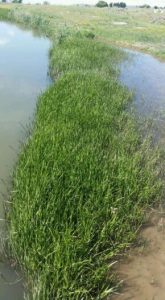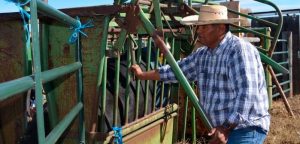The Fort Hall Reservation, located in the eastern Snake River Plain of southeastern Idaho, is home to the Shoshone-Bannock Tribes.
Activities
The Fort Hall Tribal Extension program develops and leads innovative, research-based agricultural, youth and community leadership and educational programs for the Fort Hall community. Programming includes 4-H youth development, livestock, Tribal Youth in Agriculture, natural resources, range management and gardening. Programming sustains and improves agricultural practices, works to improve the viability of Tribal farming and ranching, and improves the quality of life through access to higher education resources and opportunities.
Highlights
MEASURING IMPACT
-
“They had some really good people speak on trees, very informative, very interesting, all about the soil and what type of trees grow best here for the climate. And how to water them. Very good, very good class, very interesting.”
-
“It [4-H] changed the way that I act with my responsibility, because I always have soccer, and dance practice, and school and homework. It brings our family together. Because we’re always outside together working out in our fields and in our garden and sheep.”
FRTEP programs have had a major impact on individuals, families and tribal communities. Just how much impact has now been quantified thanks to a research project that used Ripple Effects Mapping (REM) and content analysis. The Indian Land Tenure Foundation (ILTF) engaged in a joint collaboration with an evaluation team and the Western Extension Risk Management Education Center to measure the long-term impacts of the Federally Recognized Tribal Extension Program (FRTEP) serving the Fort Hall Reservation. Click the link below to read the report.

Gardening program
Fort Hall Extension offers a wide variety of horticultural programming. All classes are hands-on so that participants can return home and actually implement the practices they have learned. Classes have included:
- Planting windbreaks
- Designing outdoor floral pots
- Planting gardens
- Watering lawns
 Range and Natural Resources
Range and Natural Resources
Fort Hall Extension coordinates natural resource programs and projects with local, state and federal agencies. These programs include:
- Range monitoring – Training is available on starting range monitoring before and after prescribed burning, which can limit wildfires. Monitoring can also be used for livestock grazing and grazing management.
- Range seeding – Extension develops and runs seeding plans to help rangeland recover after major fires. Staff coordinates these efforts with the Bureau of Indian Affairs and other tribal departments.
- Noxious weed identification and control – Noxious weeds are plants that are a nuisance, are hazardous or cause injury to people, animals, landscapes and crops while competing for water, light and nutrients. They can adversely affect human and animal health, the environment, and the quality of crop, forage, hay, aesthetics, recreation and economics.
Community garden
The community garden infrastructure was completed in 2014. Through grant funding a contractor was hired to haul soil and compost to the garden location in Fort Hall. The ground was leveled, a water system installed and walkways and fencing were constructed. Community members and families continue to enjoy this beautiful garden.
4-H and Tribal Youth in Agriculture
4-H is the largest youth organization in the world, reaching all 50 U.S. states and 80 countries. Tribal 4-H Program Director Nola Cates manages and teaches 4-H classes year-round and conducts extensive outreach to local schools and reservation districts. The 4-H program focuses on the following:
- Agriculture
- Science
- Nutrition
- Food safety
- Life skills
- Arts and crafts
The Tribal Youth in Agriculture program was developed and implemented by Nola Cates and Danielle Gunn in 2014. The program is taught in local schools throughout the school year and focuses on helping youth learn about agriculture and the essential role it plays in our lives.
Livestock programs
- Annual Beef Schools – Agents meet with producers to identify their concerns and educational needs. Additional livestock programs are conducted as industry issues and topics of concern arise.
- Cowboy Schools – These fun, informative programs include two hours of lecture followed by two hours of practical application in the corral or laboratory.
- Bull Grading Program – More than 150 bulls are graded each year to ensure that all bulls running on a particular range unit meet minimum quality standards and other factors.
- Farm and Ranch Management – Record keeping, marketing and analyzing the business aspect of farming and ranching is covered in an 18-week farm business management program offered each year to producers.
- Pesticide Licensing and Training – Fort Hall Extension offers an annual Idaho State Pesticide Applicator Training and Licensing Program.
COVID-19 Activities
- Maintained contact with 4-H parents, grandparents, and youth by phone, text and social media regarding available programs and projects during the mandatory tribal shutdown.
- Distributed project supplies and detailed instructions to 4-H families and youth.
- Maintained contact with other 4-H professionals by Zoom regarding 4-H programming, the local fair, and 4-H camp.
- Maintained contact with the Fort Hall Reservation Recreation Department to discuss youth programming for spring and summer months.
- When allowed by tribal directives, taught 4-H programming and the Tribal Youth in Agriculture Program at the tribal afterschool program facilities that were conducive to COVID-19 safety protocols.
- Initiated and maintained constant contact with producers regarding animal health programs and issues via phone calls, texting, and small group meetings which were approved by University of Idaho administration.
- Evaluated 178 bulls for Extension programs to maintain the integrity of cattle quality on the Fort Hall Reservation.
- Authored popular press articles for the local tribal newspaper.
- Initiated, developed, and implemented estrus synchronization and artificial insemination programs for tribal producers.
- Designed and planted a community windbreak with a limited number of volunteers that aligned with COVID-19 safety protocols.
- Addressed community member questions about lawn care, weed identification, and gardening by phone.
- Distributed a letter and flyer regarding the Coronavirus Food Assistance Program (CFAP) to approximately 175 individuals and answered questions from producers regarding CFAP.
- Developed and implemented COVID-19 safety procedures for the Fort Hall FRTEP office.
- Discussed and provided examples on how to follow COVID-19 safety protocols with 4-H youth, producers, and other stakeholders.

Contact Information
Danielle Gunn – Program Director
Phone Number
208-236-1046
dgunn@uidaho.edu